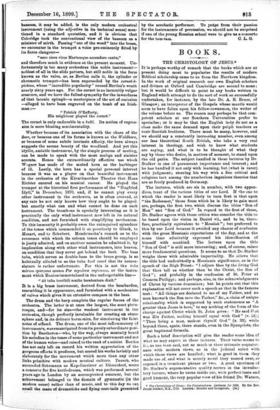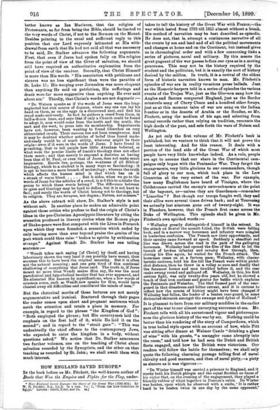BOOKS.
THE CHRISTOLOGY OF JESUS.*
IT is perhaps worthy of remark that the books which are at present doing most to popularise the results of modern Biblical scholarship came to us from the Northern kingdom. In the work of original research our own English scholars and divines at Oxford and Cambridge are second to none ; but it would be difficult to point to any books written in England which attempt to do the sort of work so successfully undertaken, for instance, by the late Dr. A. B. Bruce, of Glasgow; an interpreter of the Gospels whose mantle would seem to have fallen upon his fellow-townsman, the writer of the volume before us. The reason may perhaps be that com- petent scholars at our Southern Universities prefer to specialise; or it may be that the English laity do not as a class make the same demand upon their pulpit teachers as their Scottish brethren. There must be many, however, and we should say a constantly increasing number, even among oar less theoretical South British, who take a very real interest in theology, and wish to know what students are saying, and what is to be thought of what they say by those who desire, in matters of moment, to stand upon the old paths. The subject handled in these lectures by Dr. Stalker is one of paramount importance and interest ; and he has handled it not only with learning, but (what is rarer) with judgment ; steering his way with a fine critical and religious tact among the numberless ingenious theories that are so freely produced in Germany.
The lectures, which are six in number, with two appen- dices, treat of the various titles of our Lord. If the one to which the reader is most likely to turn first is that upon "the Redeemer," those from which he is likely to gain most are, perhaps, the first two, which discuss the titles " Son of Man" and "Son of God." In regard to the first of these, Dr. Stalker agrees with those critics who consider the title to be based upon the vision in Daniel vii., and to be, there- fore, practically equivalent to " Messiah"; but preferred to this by our Lord because it avoided any chance of confusion with the gross Messianic expectations of the day, and at the same time admirably expressed his identification of himself with mankind. The lecture upon the title " Son of God " is still more interesting ; and, of course, raises more fundamental questions. It seems to us that Dr. Stalker weighs these with admirable impartiality. He allows that the title had undoubtedly a Messianic significance, as in the speech of the High Priest: "I adjure thee by the living God that thou tell us whether thou be the Christ, the Son of God "; and probably in the confession of St. Peter at Caesarea Philippi ; and perhaps, also, in the acknowledgments of Christ by various demonists; but he points out that this
explanation will not cover such a speech as that in the famous text : "All things are declared to me of my Father, and no man knoweth the Son save the Father," &c., a claim of unique relationship which is supported by such statements as " A greater than Jesus is here," to say nothing of the form of the charge against Christ which St. John gives : " He said Cod was His Father, making himself equal with God " (v.18); " Thou being a man, makest thyself God" (x. 33), while beyond these, again, there stands, even in the Synoptists, the great baptismal formula.
Such a brief description will give the reader some idea of what he may expect in these lectures. Their value seems to
ii-, as has been said, not so much in their intimate acquaint- ance with modern views, as in the judicial spirit with which these views are handled ; what is good in them they made use of, and what is merely novel they passed over, or exposed in a trenchant phrase or two. A good specimen of Dr. Stalker's argumentative quality occurs in the introduc- tory lecture, where he turns inside out, with perfect, taste and good humour, the very popular view of his friend Dr. Watson, • The Christology of Jesus : the Cunningham Lectures for 1899. By the Rev. James Stalker, M.A., D.D. London : Hodder and Stoughton. NJ " Dr. Watson speaks as if the words of Jesus were the long- neglected but rich source of dogmas, where any one can lay his hand on them, as on the eggs in a discovered nest, and find his creed made-and-ready. In fact he gathers a creed from them, in half-a-dozen lines, and says that if only a Church could be found to adopt it, men would come from the north and the south, the east and the west, to press into its membership. Experiments have not, however, been wanting to found Churches on very abbreviated creeds. Their success has not been conspicuous. And it may be doubted whether articles of belief thus found made- and-ready would be of much utility, whatever might be their origin—even if it were in the words of Jesus. I have found in preaching, that to tell people how little Abraham believed, or what were the precise limits of Isaiah's theology does not affect them much ; and that merely to expound a doctrine as having been that of St. Paul, or even that of Jesus, does not make much impression. Herein lies, perhaps, the weakness of all Biblical theology, which to a student is in many ways so fascinating : it is apt to become a mere branch of archaeology ; whereas the truth which affects the human mind is that which has on it a streak of warm blood But b sides, when we go to the words of Jesus for the articles of a creed, is 1:0,t this to mistake the genus to which these words belong ? The difference between re igion and theology may be hard to define, but it is not hard to feel ; and surely the words of Christ belong not to theology, but to religion. They are kerugma, not dogma ; Nature, not science."
As the above extract will show, Dr. Stalker's style is not
without salt. In another place he makes an admirable point against those critics who profess to find the origin of Christ's ideas in the pre-Christian Apocalyptic literature by citing the
sensation produced in literary circles when the Roman plays of Shakespeare were first compared with the Lives in Plutarch upon which they were founded, a sensation which ended by only leaving more than ever beyond praise the genius of the poet which could thus raise " bodies to spirits by sublimation
strange." Against Wendt Dr. Stalker has one telling sentence :-
"Wendt takes each saying [of Christ] by itself, and having laboriously shown the very least it can possibly have meant, then assumes this to have been the original meaning. But it is often not the natural meaning ; and one gets tired of this continual shallowing of everything that Jesus said. The truth is, if Jesus meant no more than Wendt makes Him say, He was the most paradoxical and hyperbolical teacher that has ever appeared, and He alienated His hearers by mystifications, when a few words of common sense, such as Wendt now speaks for Him, would have cleared away all difficulties and conciliated the minds of men."
But the rhetorical merits of these lectures are not merely argumentative and ironical. Scattered through their pages the reader comes upon short and pregnant sentences which catch the attention and retain a place in memory. For example, in regard to the phrase "the Kingdom of God ": "Both employed the phrase ; but His countrymen laid the emphasis on the first half of it, while He laid it on the second"; and in regard to the "strait gate": "This was undoubtedly the chief offence to the contemporary Jews, who expected to enter the kingdom in a body, without questions asked." We notice that Dr. Stalker announces two further volumes, one on the teaching of Christ about salvation recorded by the Synoptists, and the other on that teaching as recorded by St. John ; we shall await them with much interest.











































 Previous page
Previous page